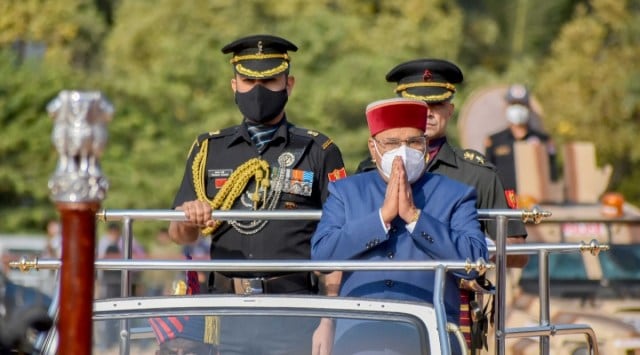Karnataka governor Thawar Chand Gehlot gives nod to ordinance for anti-conversion Bill
A cabinet meeting headed by Chief Minister Basavaraj Bommai last week had approved a proposal for the issuance of the Bill as an ordinance to facilitate the immediate introduction of an anti-conversion law
 Karnataka Governor Thawar Chand Gehlot (Express Photo by Jithendra M)
Karnataka Governor Thawar Chand Gehlot (Express Photo by Jithendra M)Despite opposition from various quarters, Karnataka Governor Thawar Chand Gehlot Tuesday gave his assent to the Right To Freedom of Religion Ordinance which will pave the way for an anti-conversion Bill. The assent came a day after Archbishop of Bengaluru Peter Machado met the governor and appealed to him to refrain from giving assent.
The BJP government’s move to bring in the anti-conversion law in the state had drawn criticism from the opposition and Christian groups. “The Bill, which was passed in the Assembly in December last year, has got the assent of the Governor which will now be an ordinance. It will be tabled before the Upper House (council) in the next session,” said Home Minister Araga Jnanendra.
A cabinet meeting headed by Chief Minister Basavaraj Bommai last week had approved a proposal for the issuance of the Bill as an ordinance to facilitate the immediate introduction of an anti-conversion law. The Bill, which was cleared in the Assembly in December, was proposed before the council as BJP lacked numbers and there was fear of defeat.
In the 75-member council, the Congress and JDS have 41 members and the BJP has 32 while two are Independent members. The BJP is expected to get a clear majority in the council when the polls are held for seven seats on June 3.
The Karnataka Protection of Right To Freedom of Religion Ordinance aims to prevent conversion under various circumstances. The ordinance reads, “No person shall convert or attempt to convert either directly or otherwise any other person from one religion to another by use of misrepresentation, force, undue influence, coercion, allurement or by any fraudulent means or by marriage, nor shall any person abet or conspire for conversions.”
According to the proposed law, complaints of conversions can be filed by family members, people who are related or even a colleague of the person who is getting converted.
A jail term of 3-5 years and a fine of Rs 25,000 has been proposed for people violating the law and converting people from general categories and a jail term of 3-10 years and a fine of Rs 50,000 for people converting minors, women and persons from the SC and ST communities.
It, however, provides an exemption in the case of a person who “reconverts to his immediate previous religion” as “the same shall not be deemed to be a conversion under this Act”.







